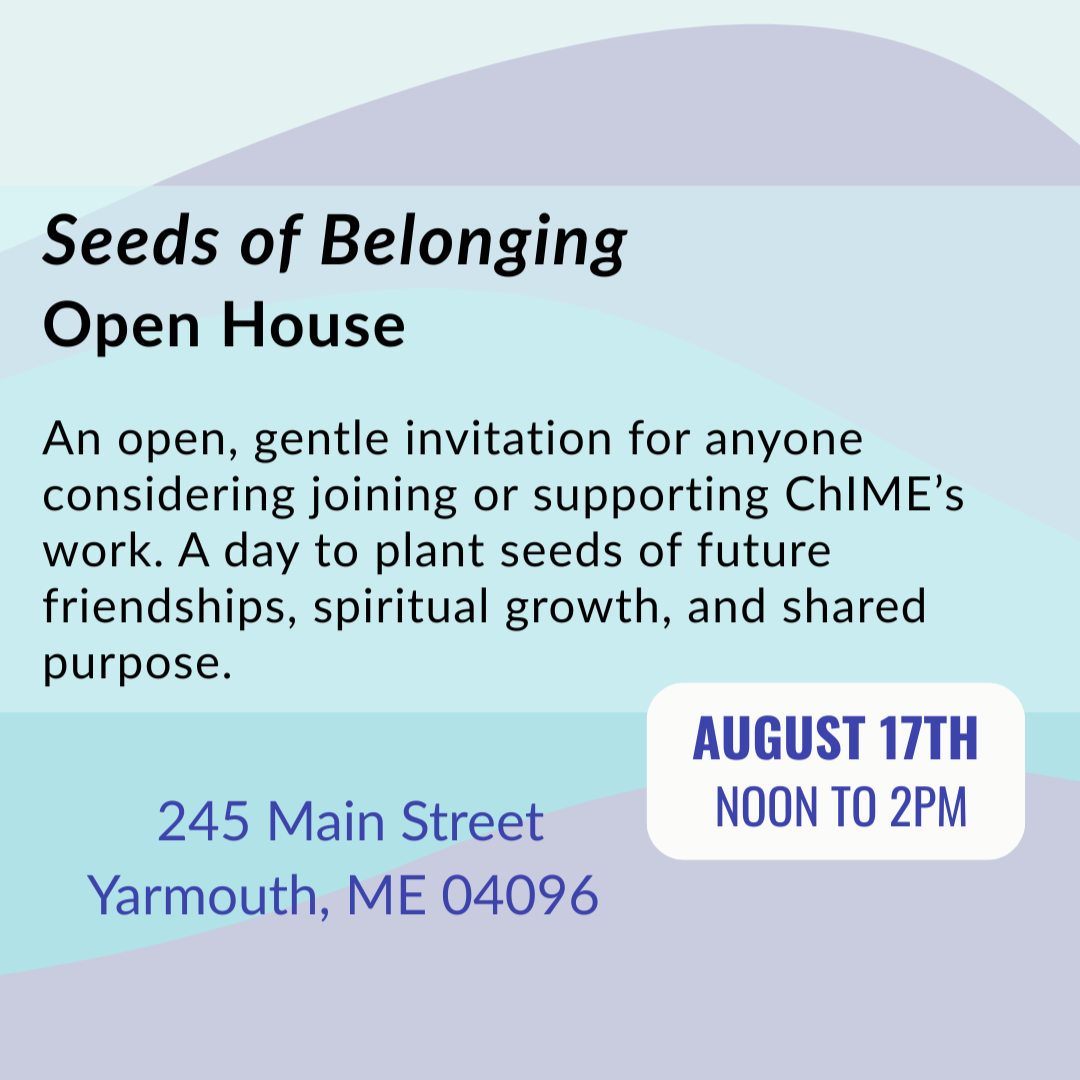
Open House
With Lindy Gifford (ChIME ‘15)
An opportunity to ask staff, students, an alumni any questions about the ChIME experience.
Registration Required
On Zoom
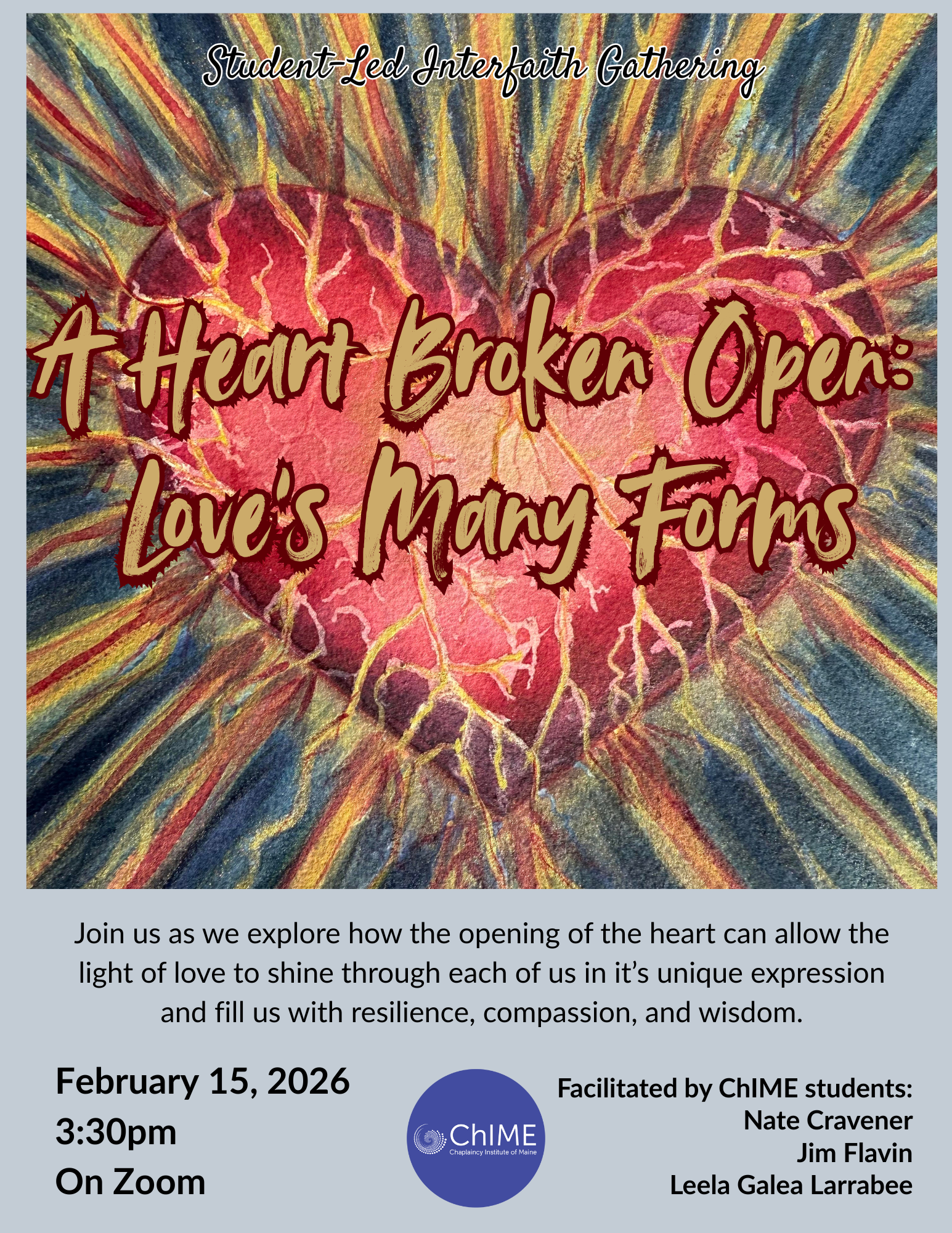



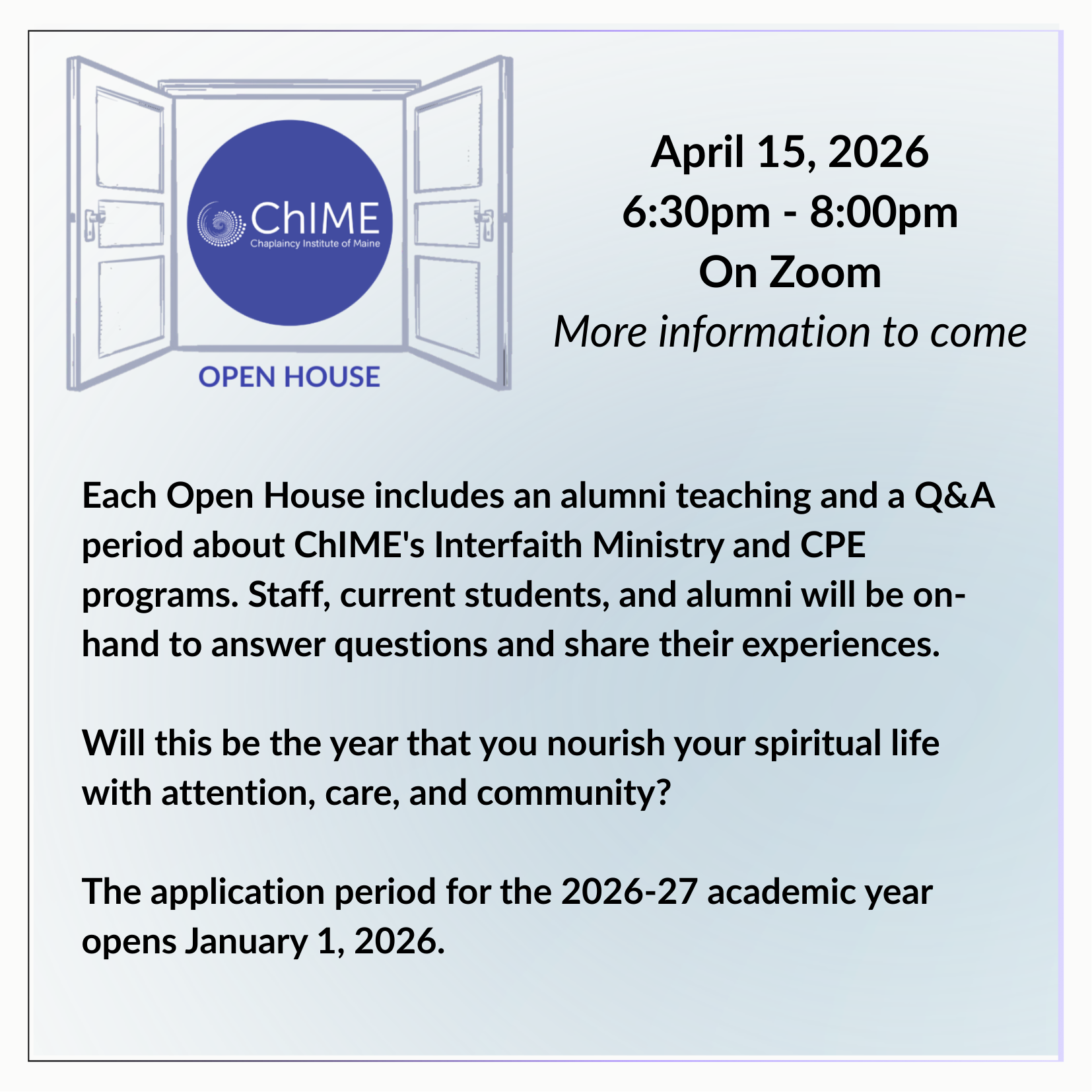



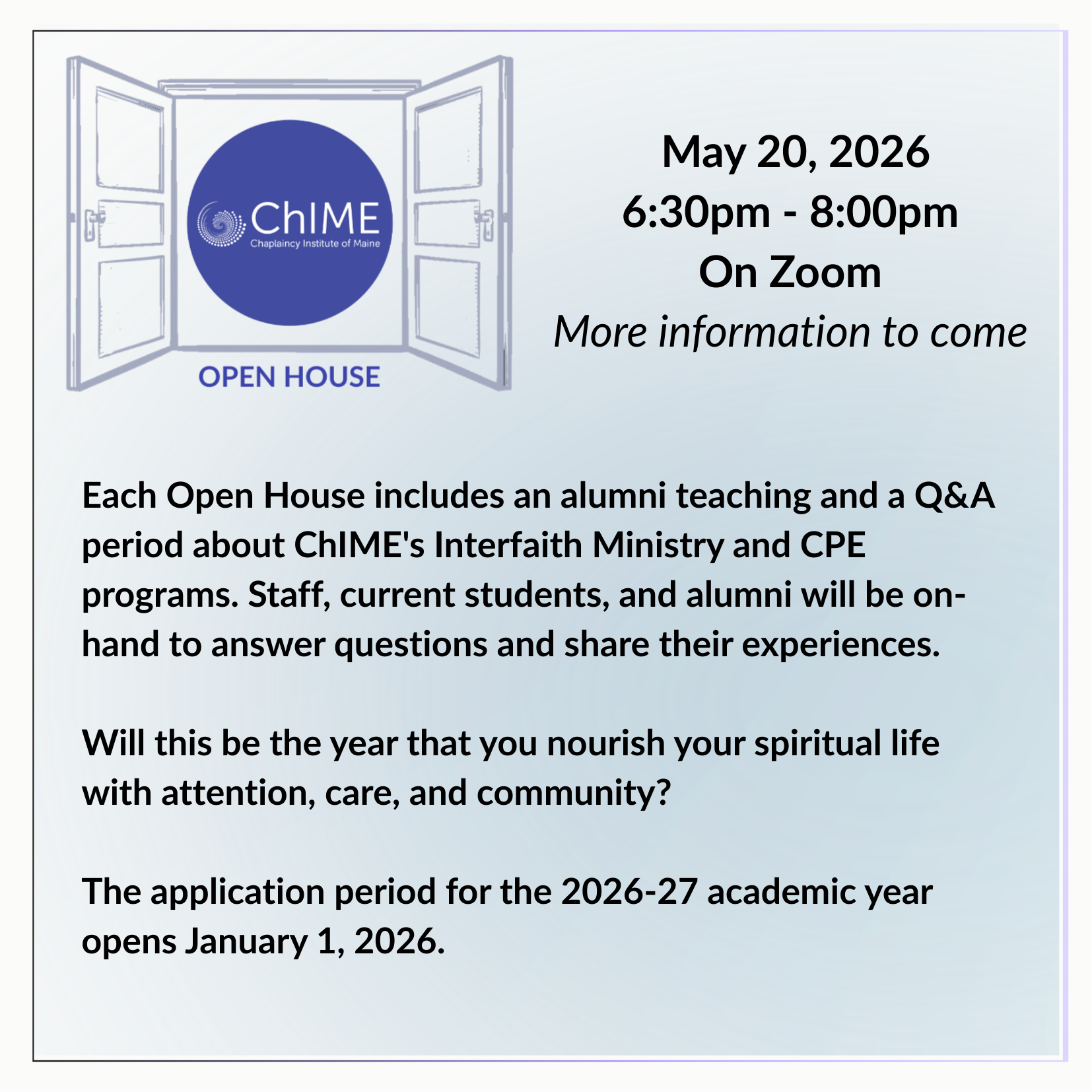
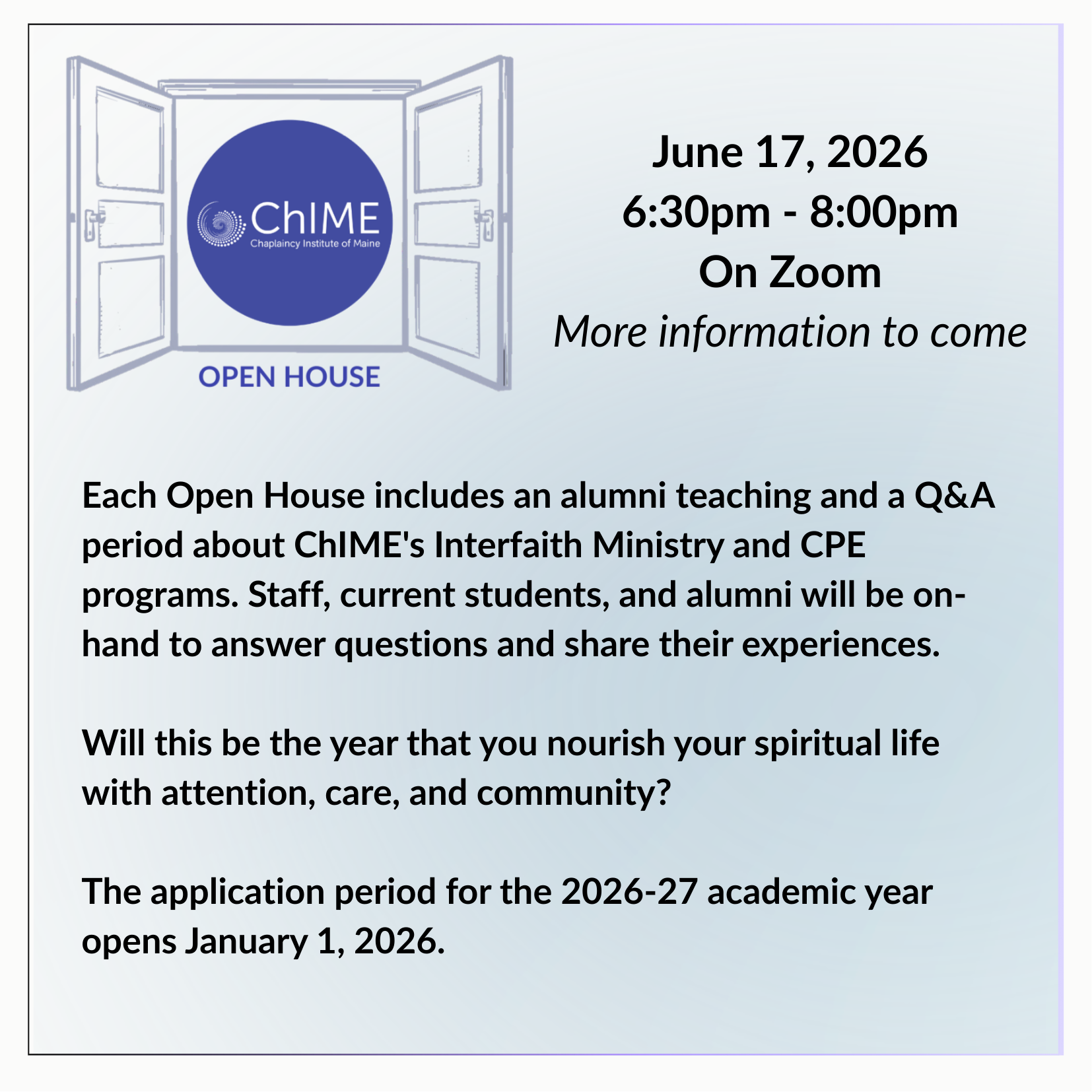
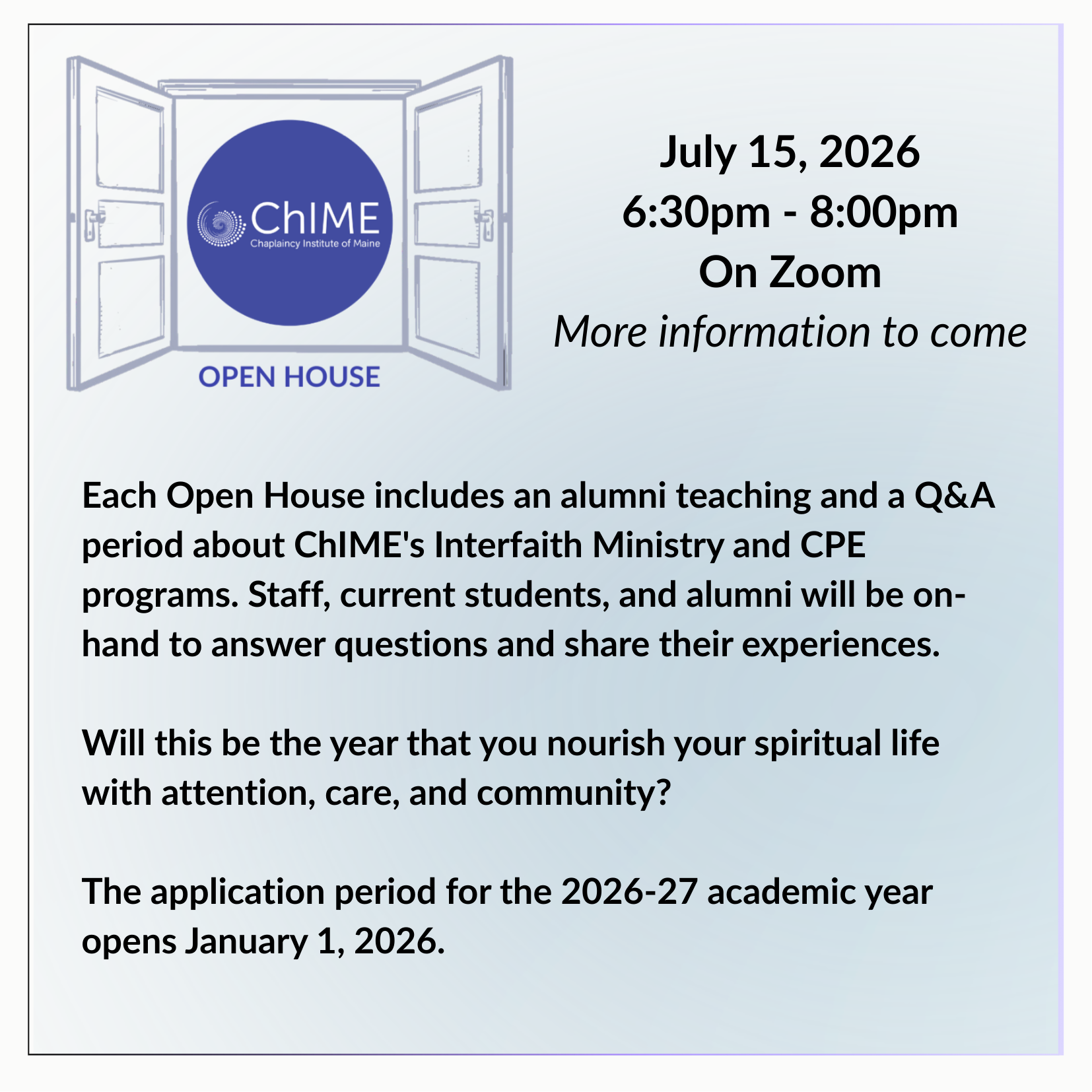
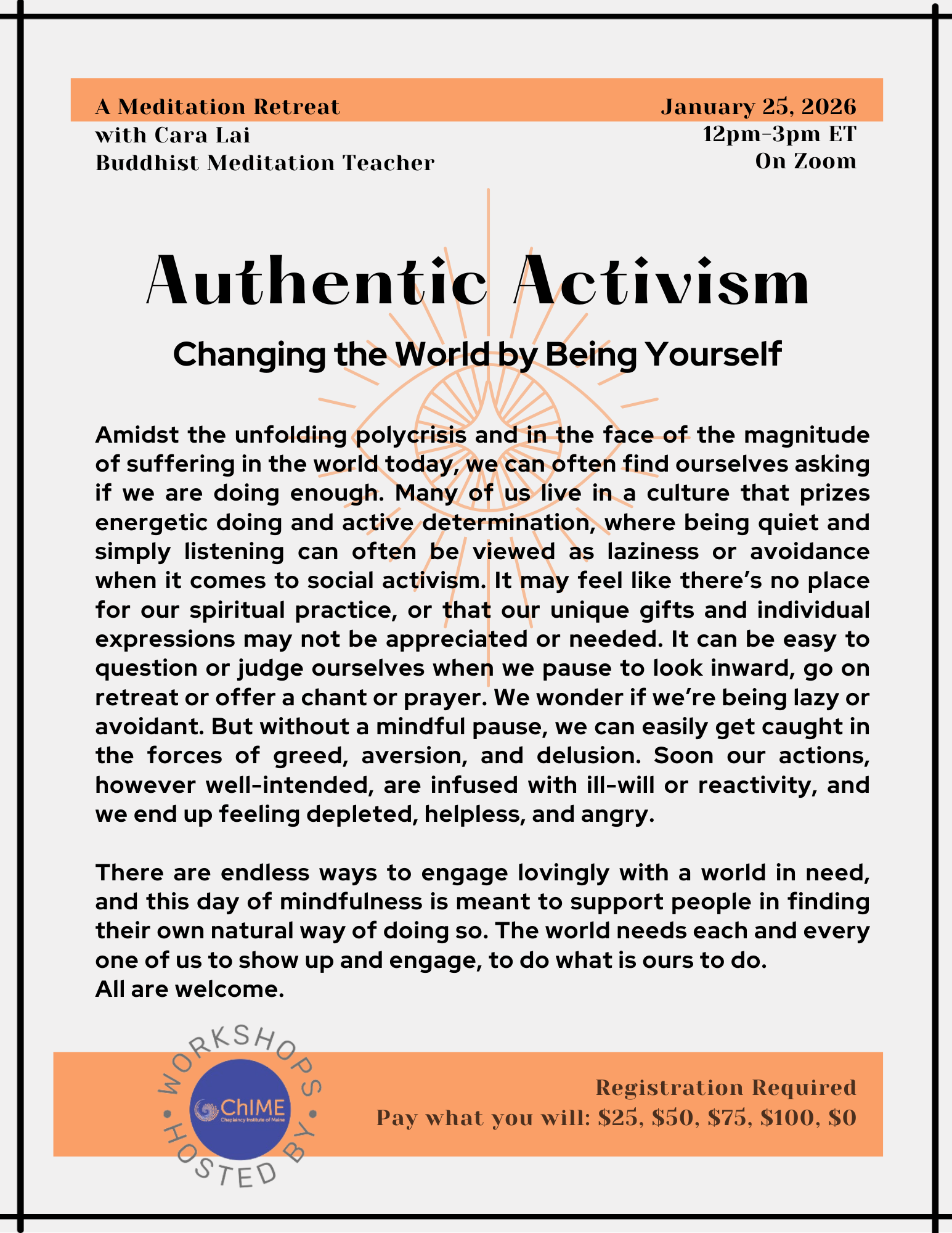
Authentic Activism: Changing the World by Being Yourself
A half-day Meditation Retreat with Buddhist Meditation Teacher Cara Lai
Registration Required
On Zoom

Grief Without Borders
“A Vigil for Peaceful Protest and Direct Action”
with Leslie Manning (ChIME ‘21)
Registration Required
On Zoom
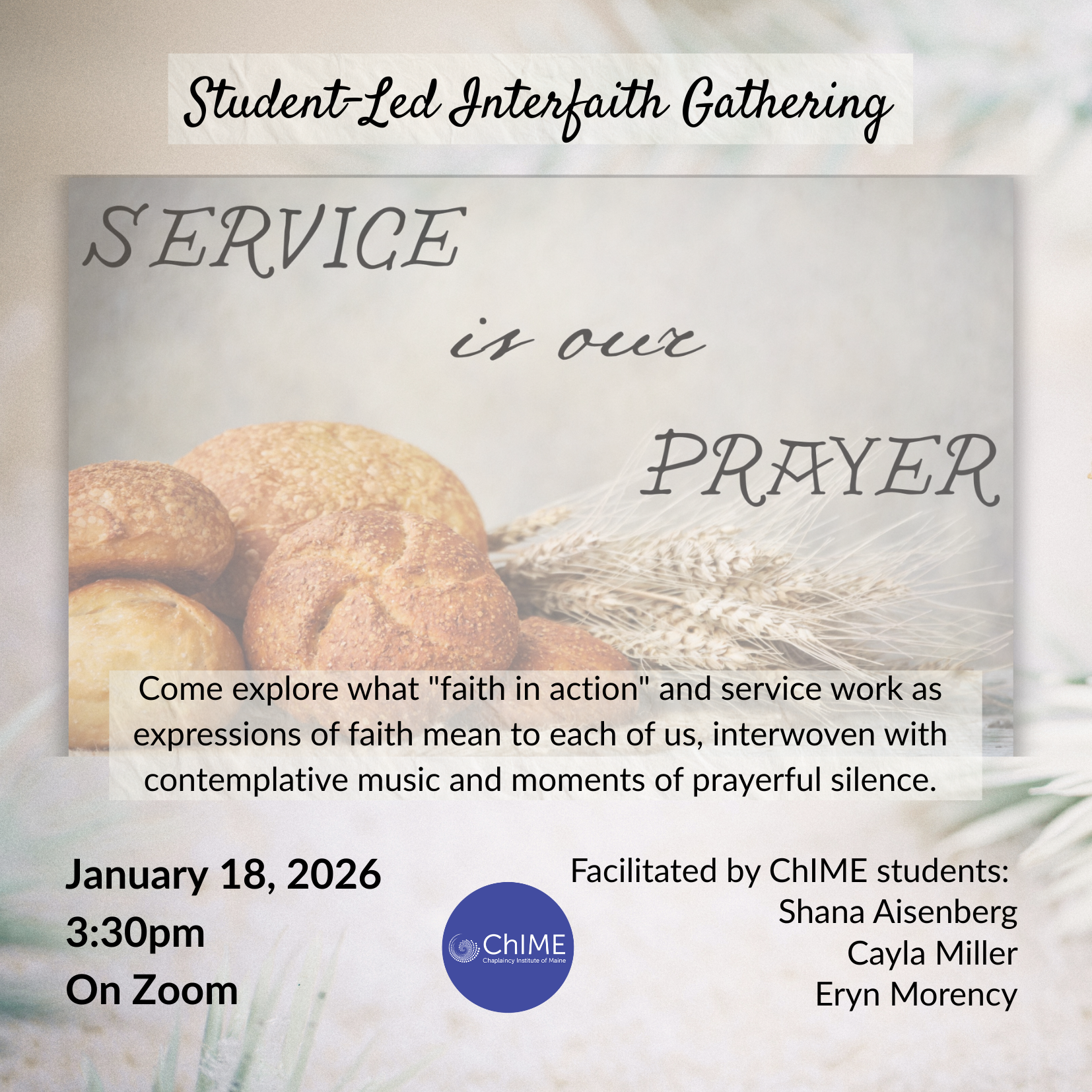

Rituals for Healing
A full-day transformative workshop with Yvette McDonnell to help you nurture the tender parts of your life, spirit, and soul.
Open to the Public; Registration Required
On Zoom


The Doctrine of Discovery from an Indigenous Perspective
Dwayne Tomah is a language keeper, director, and curator of the Sipayik Museum and teacher of the Passamaquoddy language and culture.





Tending Wildness Within & Without
Aram lives with his wife and daughter in a house that is shaded by a great big oak tree. He has a coaching practice that supports people to slow down and get clear on what they want, then take playful and purposeful steps toward living out their vision for a thriving life. He writes and teaches regularly about spiritual formation. And he serves part-time as the pastor of Edgecomb Community Church in Maine.
Aram is also a wilderness guide, taking people to places where encounters with wildness and experiences of formation flow together. He guides in the backcountry, in forests and canyons, along coasts and rivers. And he guides people to the metaphorical confluence of wildness and formation in houses of worship, classrooms, board rooms, and living rooms.
Aram is a Registered Maine Guide and Wilderness First Responder. He has a Master of Arts degree in Religious Studies from Chicago Theological Seminary. And he is a student of ontological coaching with the Academy for Coaching Excellence.

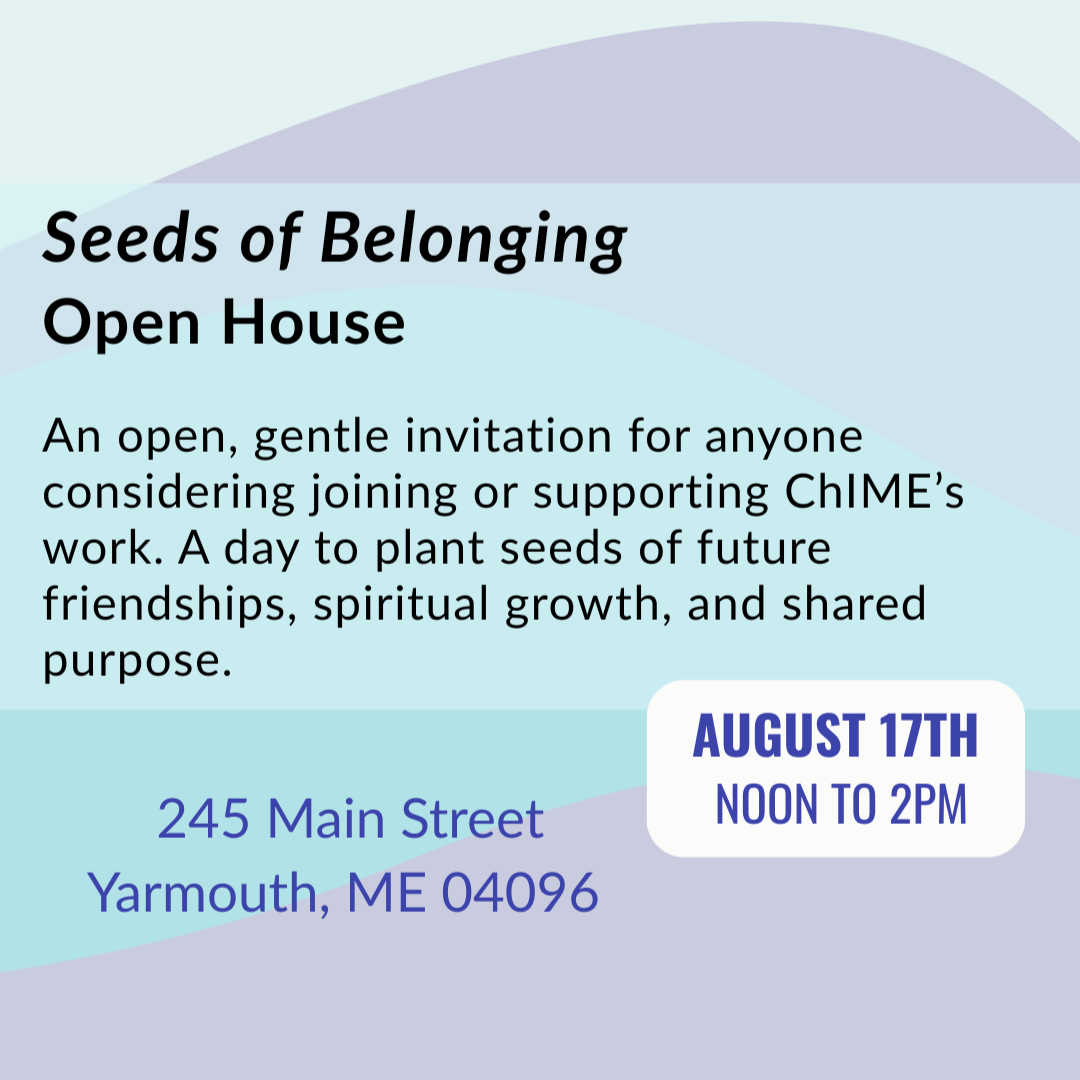
Tending New Ground Open House
This August, we invite you to step into ChIME’s new home as we “open the circle” together. Each gathering offers a unique way to explore our missions and our new space: from the joyful creativity of our Art Walk and Silent Auction, to the quiet warmth of our open houses where we tend new ground and plant seeds of belonging.
Whether you are a long-time friend or new to ChIME, come celebrate this unfolding chapter with us, where art, spirit, and community meet in love.

Tending New Ground Open House
This August, we invite you to step into ChIME’s new home as we “open the circle” together. Each gathering offers a unique way to explore our missions and our new space: from the joyful creativity of our Art Walk and Silent Auction, to the quiet warmth of our open houses where we tend new ground and plant seeds of belonging.
Whether you are a long-time friend or new to ChIME, come celebrate this unfolding chapter with us, where art, spirit, and community meet in love.

Rooted in Art, Growing in Community
This August, we invite you to step into ChIME’s new home as we “open the circle” together. Each gathering offers a unique way to explore our missions and our new space: from the joyful creativity of our Art Walk and Silent Auction, to the quiet warmth of our open houses where we tend new ground and plant seeds of belonging.
Whether you are a long-time friend or new to ChIME, come celebrate this unfolding chapter with us, where art, spirit, and community meet in love.

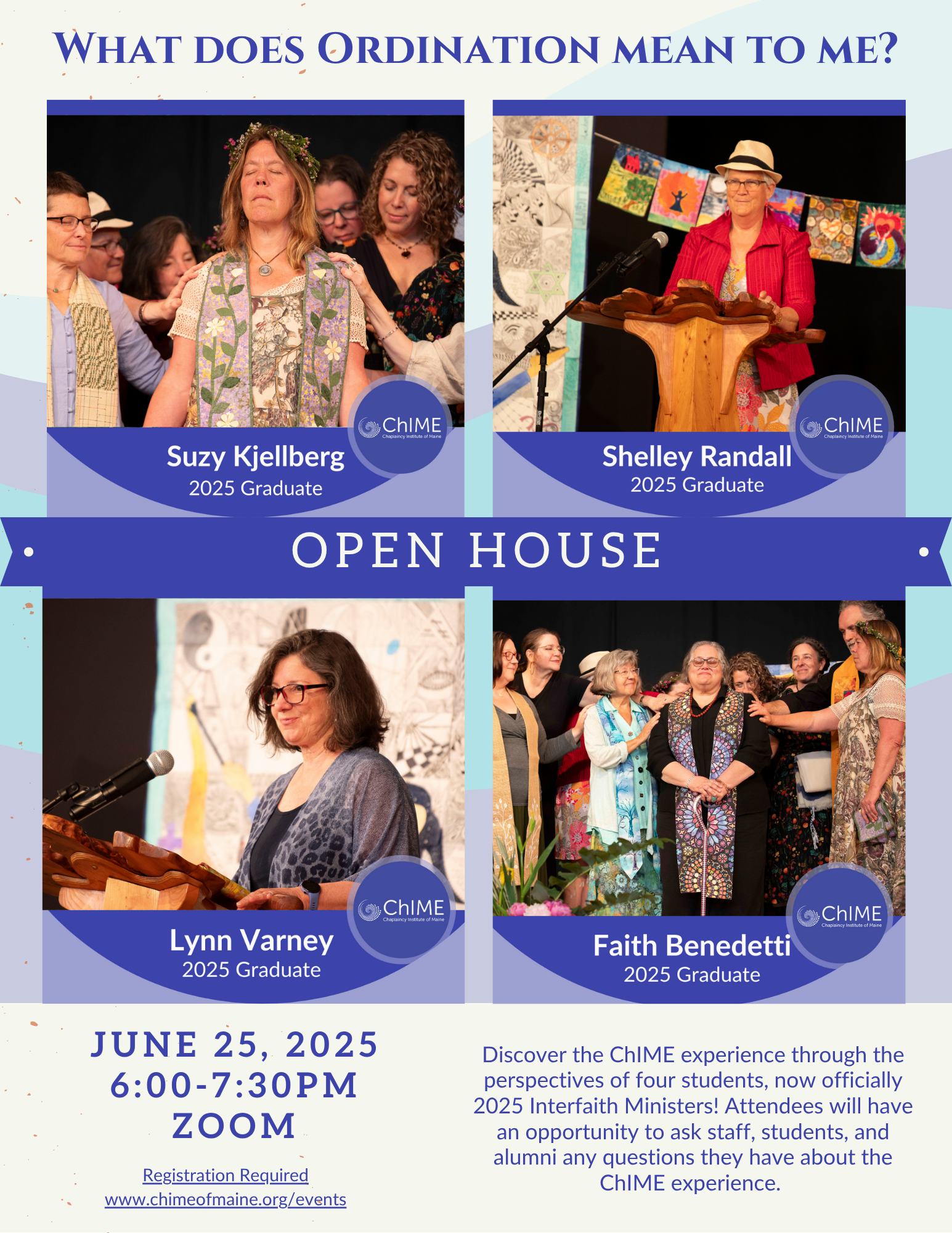
What does Ordination mean to me?
Over the last 23 years, ChIME has Ordained over 225 Interfaith Ministers. That’s a lot of people serving their communities with attention to spiritual presence, integrity, and prophetic voice!
In this Open House, 4 newly Ordained Interfaith Ministers from the class of 2025 will share what Ordination means to them and how their time at ChIME prepared them for the service emerging on their horizons.


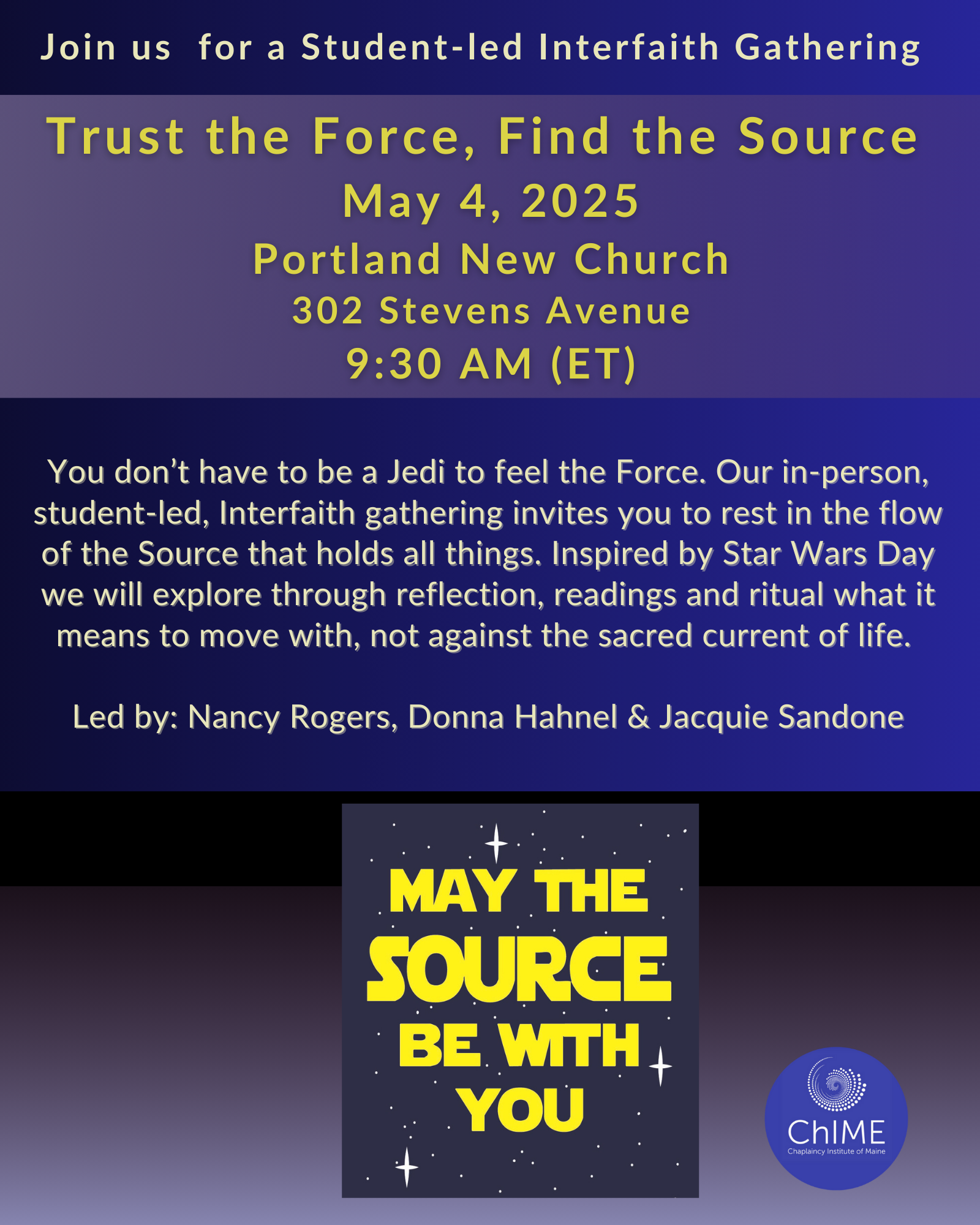


Death Notification/On-Scene Bereavement
Facing the inevitable truth of mortality, we all experience deep grief when losing loved ones. While mourning and healing are part of our shared human experience, delivering the painful news of someone's death—known as a 'death notification'—is something many of us are unprepared for. This workshop, facilitated by Kate Braestrup, offers practical guidance on how to approach this difficult task with care and compassion.


Being with Grief
Being with Grief is a full-day gathering designed for anyone who accompanies others through grief: hospice volunteers and staff, family caregivers, chaplains, Interfaith ministers, medical care providers, and more...
Keynote speaker Koshin Paley Ellison Sensei draws on Zen principles to share a contemplative approach that invites participants to the practice of staying present, showing up fully wherever we are – at the bedside in a hospital or with a loved one at dinner.
A panel discussion and interactive breakout sessions provide opportunities for creative exploration of grief, small group discussions tailored to specific experiences of loss, and practices for personal reflection and professional care. Through writing, movement, ritual, or conversation, these sessions provide space to process and honor grief in its many forms.
With support from the Maine Community Foundation’s Hospice Fund and St. Joseph’s College, the event ensures accessibility with a sliding-scale registration fee, inclusive of meals.
This workshop is an invitation to sit with grief, learn from it, and find connection in shared experience.
Schedule of Events
Comfort in the Midst of Discomfort: Grounded, Soft, Upright, Open
Koshin Paley Ellison Sensei
Breakout Sessions
Bones and Seeds, Susannah Crolius
Writing to Heal, Catharine H. Murray
Braiding the Past and Present: Navigating Unfinished Business in Grief
Steven Karaiskos
Yoga for Your Grieving Heart, Susannah SanFillippo
Circle Conversations, Rev. Angie Arndt and Rev Craig Werth
Lunch Conversation Tables
Maine Death with Dignity provides services, fact-based education, and end-of-life advocacy to people who wish to actively explore the meaning of life through embracing the certainty of death. A primary program of Maine Death with Dignity is connecting people to the information they need to make fully-informed decisions regarding all their end-of-life care options, and to support patients and providers through the entire process as needed. Table Host: Rev. Val Beebe-Lovelace
Voluntary Stopping Eating & Drinking (VSED) is when a mentally capable individual decides to control their own dying by making a conscious decision to refuse foods and fluids of any kind, including artificial nutrition and/or hydration, in order to advance the time of their death. Table Host:. Priscilla Platt
At Hospice of Southern Maine, we believe in doing everything we can to provide the highest quality of care for our patients. Hospice care focuses on the individual at the end of life, and their family. Hospice provides individualized care and support for people with a life expectancy of 6 months or less (if the illness runs its natural course). Table Host: Rev. Larry Greer
The Center for Grieving Children is a nonprofit organization that provides a safe space, loving peer support, outreach, and education to grieving children, teens, young adults, families, and the community. Services are offered at no cost in Portland, Sanford, and virtually, and are led by our dedicated and highly trained staff and volunteers thanks to the generous support of our wider community. Table Hosts: Kristin Lash, MSW – Grief Services & Volunteer Coordinator Jamie Schwellenbach, LCPC, DMT – Grief Services Manager & TLC Coordinator
Visit the Relic-Query Installation (Susannah Crolius)
Historically, reliquaries were highly ornate containers for all manner of dead, holy things, often the actual bones, body parts or sacred objects of holy or martyred persons. While most prominent in medieval Catholicism, every religious expression has some form of containing and revering sacred objects.
This portable installation is a different take on the traditional reliquary. It is a contemporary, contemplative, personal interactive refuge for reflecting on and unbinding your dry bones, the places that feel diminished, dusty, tired, frightened, dead in your heart, your body, your spiritual or faith life.

Way-Finding
It can feel impossible to heal the pain of religious trauma and moral injury. When the foundation of your trust or ability to believe anything at all feels broken beyond repair, how will you find your way?
Join us as Rev. Beebe-Lovelace, former member of an evangelical cult, shares her way-finding story from the life-long effects of mind-controlling religious injury to a place of spiritual freedom.
Guest Presenter:
Rev. Valerie Beebe-Lovelace, ChIME 2022
Executive Director Maine Death with Dignity
Spiritual facilitator, and Homeopath
Each Open House includes an alumni teaching and a Q&A period about ChIME's Interfaith Ministry program. Staff, current students, and alumni will be on-hand to answer questions and share their experiences in the program.
Will this be the year that you nourish your spiritual life with attention, care, and community?
The application period for the 2025-26 academic year is now open!


Open House: Healthcare Chaplaincy
Each Open House includes an alumni teaching and a Q&A period about ChIME's Interfaith Ministry program. Staff, current students, and alumni will be on-hand to answer questions and share their experiences in the program.
Will this be the year that you nourish your spiritual life with attention, care, and community?
The application period for the 2025-26 academic year opens March 1, 2025.
Join us for a special Open House as we welcome back three recent ChIME alumni—Julie, Polly, and Katherine—who will share their unique paths to becoming healthcare chaplains. Each of them has taken a distinct journey, shaped by their experiences at ChIME, additional training, and hands-on internships, leading them to their current roles in hospital and hospice chaplaincy.
During this session, you'll gain insight into the challenges and rewards of spiritual care in healthcare settings, the steps involved in pursuing chaplaincy as a career, and the deeply personal experiences that have shaped their callings. Whether you are considering chaplaincy, curious about the field, or simply interested in hearing heartfelt stories of service and transformation, this is an evening of learning and inspiration you won’t want to miss.
Come with your questions, reflections, and an open heart as we explore the vital work of chaplains in healthcare today.

Student-Led Interfaith Gathering; Third Sunday of every Month
This Interfaith Gathering is currently planned as an in-person event. If a shift to Zoom becomes necessary due to weather, we will send an update via email, social media, and our website closer to the date.

A Still Small Voice
Fundraiser Screening to Support ChIME’s Student Scholarship fund
Fundraiser Screening to Support ChIME’s Student Scholarship fund
Registration Required
$15, $25, $50, $100
*Please do not let finances stop you from attending. We have a small amount of scholarship tickets available. Pick the scholarship ticket if you are unable to pay but want to join!
On February 1, all registrants will receive a live link to view the film. This 14 day streaming link will be live from February 1 - February 14 and is for the registrant’s use only.
You may watch the film on your own and/or join us for an online community screening and conversation on Sunday, February 9 from 4 - 6:15 pm.
We will begin the film at 4:00. At 5:30, Abby Hall Luca, Community Coordinator, will facilitate a conversation to explore the film’s themes, questions, and take-aways.
Join us at 4 for the film, at 5:30 for the community conversation, or settle in with us for the whole afternoon. We look forward to sharing this powerful film with you and exploring the gifts and challenges of chaplaincy together.

January Open House
January Open House
Each Open House includes an alumni teaching and a Q&A period about ChIME's Interfaith Ministry program. Staff, current students, and alumni will be on-hand to answer questions and share their experiences in the program.
Will this be the year that you nourish your spiritual life with attention, care, and community?
The application period for the 2025-26 academic year opens March 1, 2025.
Join Us for Our First Open House of 2025!
Date: January 29, 2024
Time: 6:00 - 7:30 PM (ET)
Location: Zoom
Host: Abby Luca, ChIME Community Coordinator
We’re thrilled to welcome Circe Moss MacDonald, a 2019 ChIME Eco Chaplain, Water Priestess, and Ceremonial Artist, as our guest presenter. Circe will share her journey of co-creating The Cosmic Mass, a monthly ceremony at the Portland New Church for those who identify as spiritual but not religious (SBNR).
Discover the Four Mystical Paths of Creation Spirituality
Learn how these concepts come to life in The Cosmic Mass
Explore how ceremony and community intertwineWhether you're curious about Creation Spirituality, seeking connection, or simply looking to experience something inspiring, this Open House is for you.
RSVP








